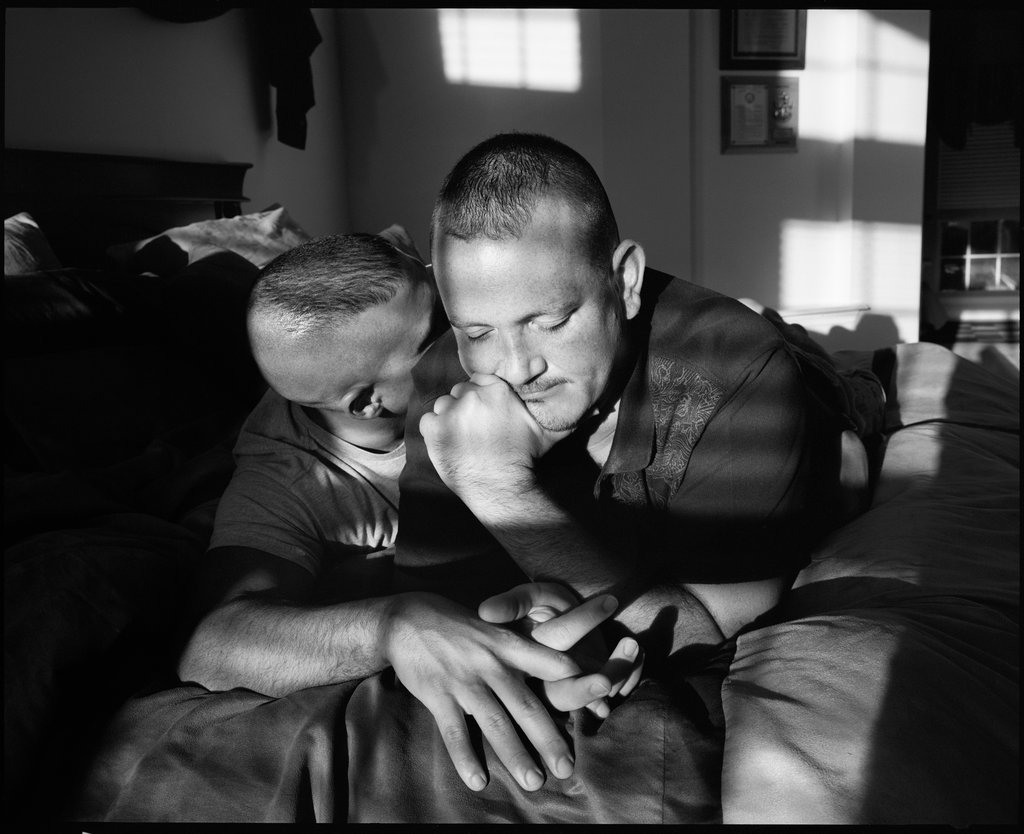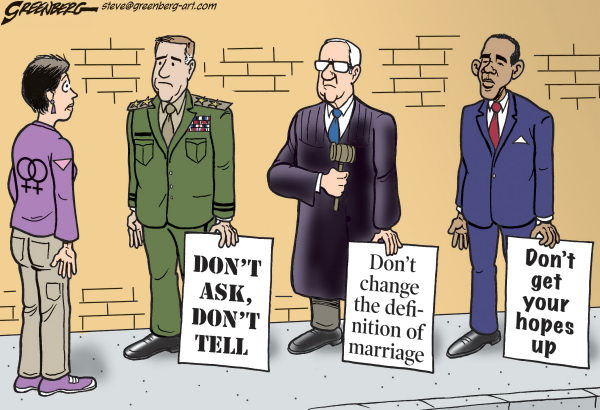|
Vocapedia >
Men,
Women
Gays, Gay / LGBT rights, Homosexuality
U.S. military > Gay service members

Debra Fowler, Lowell, Mass.
Specialist, U.S. Army, 1986-88. Korean Linguist.
Dishonorable Discharge, fraudulent entry,
outed when being
investigated for security clearance.
Photographs by Vincent Cianni
Exposures
Out, and Serving
NYT
Sunday Review
9 March 2014
https://www.nytimes.com/interactive/2014/03/09/
opinion/sunday/exposures-military.html

Matt McCary, right,
Orange Park, Fla. Airman First Class E-3,
U.S. Air Force, 1998-2000.
Intelligence Specialist.
Honorable Discharge;
put under arrest after being singled out
by co-worker;
discharged within five days with no investigation.
David Cochenic,
Orange Park, Fla. Chief Petty Officer E-7,
U.S. Navy, 1992-present.
Field Medical Service Technician, Aerospace Medical
Technician.
Photographs by Vincent Cianni
Exposures
Out, and Serving
NYT
9 March 2014
https://www.nytimes.com/interactive/2014/03/09/
opinion/sunday/exposures-military.html

Dustin Hiersekorn, left, Boise, Idaho.
Private, U.S. Marine Corps Reserves, 2010.
Discharged for medical reasons two weeks after enlisting.
Zachary Werth, Boise, Idaho.
Specialist, Idaho Army National
Guard, 2007-10.
Medic. General Discharge Under Honorable Conditions.
Photographs by Vincent Cianni
Exposures
Out, and Serving
NYT
Sunday Review
9 March 2014
https://www.nytimes.com/interactive/2014/03/09/
opinion/sunday/exposures-military.html

Steve Greenberg
Cagle
26 June 2010
Related
http://www.nytimes.com/2010/02/03/us/politics/03military.html
http://www.nytimes.com/2010/07/10/opinion/10sat1.html
the United States military > openly gay service members
http://www.nytimes.com/interactive/2014/03/09/
opinion/sunday/exposures-military.html
cartoons > Cagle > Don't ask, don't tell repeal
USA December 2010
http://www.cagle.com/news/DADT10/main.asp
"don't ask, don't tell''
USA
The policy known as "don't ask, don't tell''
was made law in
1993
amid a debate over the role of gays
in the military.
It limits the military's ability
to ask service members
about their sexual orientation (don't ask)
and allows homosexuals to serve
provided they keep quiet
about their sexual orientation (don't tell)
and refrain from homosexual acts.
https://www.nytimes.com/topic/subject/
dont-ask-dont-tell
https://www.nytimes.com/topic/subject/
dont-ask-dont-tell
https://www.npr.org/2020/12/26/
949642457/a-gay-veteran-remembers-serving-in-silence
http://www.nytimes.com/interactive/2014/03/09/
opinion/sunday/exposures-military.html
http://www.nytimes.com/2010/12/19/us/politics/19cong.html
http://www.nytimes.com/2010/12/19/opinion/19dowd.html
http://www.nytimes.com/2010/12/01/opinion/01wed1.html
http://www.nytimes.com/2010/09/22/us/22legal.html
http://www.nytimes.com/2010/09/22/us/politics/22cong.html
http://www.nytimes.com/2010/09/22/opinion/22wed1.html
http://www.nytimes.com/2010/09/10/us/10gays.html
http://www.nytimes.com/2010/05/25/us/politics/25tell.html
“Class II homosexual”
http://www.nytimes.com/2015/09/07/us/
gay-veterans-push-for-honorable-discharges-they-were-denied.html
Corpus of news articles
Gays, Gay / LGBT rights, Homosexuality
An Openly Gay Man Runs the Army
MAY 21, 2016
The New York
Times
Sunday review
Editorial
By THE
EDITORIAL BOARD
Last week an
openly gay man, Eric Fanning, became secretary of the Army. Read that sentence
again and contemplate what it reveals about how much and how quickly American
society has changed. Only five years ago, openly gay people were barred from
serving in its armed forces. During Mr. Fanning’s lengthy confirmation process,
his sexual orientation was simply not an issue. That is a tribute to those who
fought so hard to repeal the ban, and a measure of the nation’s at times
uncertain, but as yet unfailing, march toward equality.
In retrospect the fight that convulsed this country over whether gay Americans
should serve in uniform seems senseless, almost absurd. Yet it is instructive,
if only because a Pentagon plan to allow transgender Americans to serve openly
in uniform remains stalled by a similar, albeit quieter, debate.
There is broad agreement that prohibiting openly gay people from serving was a
cruel policy that abetted bigotry. It legitimized the notion that being gay was
shameful and incompatible with the valorous profession of arms. It cut short the
careers of talented people who had been performing vital work in wartime, which
weakened the military.
It is embarrassing now, even shocking, to revisit the arguments and laments of
those who sought to keep the military gay-free.
In 2007, Gen. Peter Pace, then the chairman of the Joint Chiefs of Staff, told
The Chicago Tribune, “I believe homosexual acts between two individuals are
immoral and that we should not condone immoral acts.” A year later, Elaine
Donnelly, who founded an advocacy group that has sought futilely to keep
military personnel policy frozen in the mores of the 1950s, warned during a
congressional hearing about “a sexualized atmosphere in our armed forces.” She
expressed alarm about “forced cohabitation” and the spread of H.I.V.
Two years after that, when Congress appeared to be on the brink of repealing the
ban, Gen. James Amos, then the commandant of the Marine Corps, cautioned that
openly gay troops would be a distraction that could cost lives on the
battlefield. “We’ve got Marines at Walter Reed with no limbs,” he pleaded in a
last-ditch effort to keep service members in the closet. Senator John McCain
indulged the general’s fearmongering. “Today is a very sad day,” Mr. McCain said
somberly during the Senate debate on Dec. 18, 2010, as he acknowledged that he
and other like-minded lawmakers had been outgunned.
The policy was repealed without a hitch. It didn’t result in weakened unit
cohesion, lower morale or missing limbs. As service members came out to their
supervisors, they were embraced. “Millennials just don’t care about sexuality
the way past generations did,” said Lt. Col. Paul Larson, a straight Army
infantry officer. “The rest of us didn’t care. We all knew gays were serving
with distinction.”
The controversy over lifting the exclusion of openly transgender service members
has been less caustic and less public. After Secretary of Defense Ashton Carter
pledged last July to repeal that ban within six months, a few senior military
officials pushed back. They steered clear of framing their misgivings on
morality grounds, instead voicing concerns about “military readiness” and unit
cohesion. Gen. Mark Milley, the Army chief of staff, has been one of the leading
skeptics at the Pentagon. In a recent interview, he said that “serious,
significant issues need to be completely vetted and studied” before transgender
people are allowed to serve openly. “I have to focus on the readiness of the
force,” he said.
Those concerns cannot be indulged any longer at the expense of the civil rights
and dignity of Americans who volunteered to serve in wartime. There is every
reason to believe that repealing the transgender ban will be seamless. The
Pentagon already has a blueprint of what it would take. Mr. Fanning, who was the
first senior defense official to endorse military service by openly transgender
people, is well positioned to help overcome the lingering misgivings of those
upholding the Pentagon’s last discriminatory personnel policy.
“I’m ecstatic,” said Staff Sgt. Patricia King, a soldier in Colorado Springs who
was the first person in the infantry to transition on the job.“To know that the
secretary of the Army is supportive of open trans service, supportive of me not
only as a soldier but as a person, is a comforting feeling.”
Follow The New
York Times Opinion section on Facebook and Twitter (@NYTopinion), and sign up
for the Opinion Today newsletter.
A version of this editorial appears in print
on May 22, 2016,
on page SR8 of the New York edition
with the headline:
An Openly Gay Man Runs the Army.
An Openly Gay
Man Runs the Army,
NYT,
May 21, 2016,
https://www.nytimes.com/2016/05/22/
opinion/sunday/an-openly-gay-man-runs-the-army.html
Senate Repeals
‘Don’t Ask, Don’t Tell’
December 18, 2010
The New York Times
By CARL HULSE
WASHINGTON — The Senate on Saturday voted to strike down the ban on gay men
and lesbians serving openly in the military, bringing to a close a 17-year
struggle over a policy that forced thousands of Americans from the ranks and
caused others to keep secret their sexual orientation.
By a vote of 65 to 31, with eight Republicans joining Democrats, the Senate
approved and sent to President Obama a repeal of the Clinton-era law, known as
“don’t ask, don’t tell,” a policy critics said amounted to government-sanctioned
discrimination that treated gay, lesbian and bisexual troops as second-class
citizens.
Mr. Obama hailed the action, which fulfills his pledge to reverse the ban, and
said it was “time to close this chapter in our history.”
“As commander in chief, I am also absolutely convinced that making this change
will only underscore the professionalism of our troops as the best-led and
best-trained fighting force the world has ever known,” he said in a statement
after the Senate, on a preliminary 63-to-33 vote, beat back Republican efforts
to block final action on the repeal bill.
The vote marked a historic moment that some equated with the end of racial
segregation in the military.
It followed an exhaustive Pentagon review that determined the policy could be
changed with only isolated disruptions to unit cohesion and retention, though
members of combat units and the Marine Corps expressed greater reservations
about the shift. Congressional action was backed by Pentagon officials as a
better alternative to a court-ordered end.
Supporters of the repeal said it was long past time to abolish what they saw as
an ill-advised practice that cost valuable personnel and forced troops to lie to
serve their country.
“We righted a wrong,” said Senator Joseph I. Lieberman, the independent from
Connecticut and a leader of the effort to end the ban. “Today we’ve done
justice.”
Before voting on the repeal, the Senate blocked a bill that would have created a
path to citizenship for certain illegal immigrants who came to the United States
at a young age, completed two years of college or military service and met other
requirements including passing a criminal background check.
The 55-to-41 vote in favor of the citizenship bill was five votes short of the
number needed to clear the way for final passage of what is known as the Dream
Act.
The outcome effectively kills it for this year, and its fate beyond that is
uncertain since Republicans who will assume control of the House in January
oppose the measure and are unlikely to bring it to a vote.
The Senate then moved on to the military legislation, engaging in an emotional
back and forth over the merits of the measure as advocates for repeal watched
from galleries crowded with people interested in the fate of both the military
and immigration measures.
“I don’t care who you love,” Senator Ron Wyden, Democrat of Oregon, said as the
debate opened. “If you love this country enough to risk your life for it, you
shouldn’t have to hide who you are.”
Mr. Wyden showed up for the Senate vote despite saying earlier that he would be
unable to do so because he would be undergoing final tests before his scheduled
surgery for prostate cancer on Monday.
The vote came in the final days of the 111th Congress as Democrats sought to
force through a final few priorities before they turn over control of the House
of Representatives to the Republicans in January and see their clout in the
Senate diminished.
It represented a significant victory for the White House, Congressional
advocates of lifting the ban and activists who have pushed for years to end the
Pentagon policy created in 1993 under the Clinton administration as a compromise
effort to end the practice of barring gay men and lesbians entirely from
military service.
Saying it represented an emotional moment for members of the gay community
nationwide, advocates who supported repeal of “don’t ask, don’t tell” exchanged
hugs outside the Senate chamber after the vote.
“Today’s vote means gay and lesbian service members posted all around the world
can stand taller knowing that ‘don’t ask, don’t tell’ will soon be coming to an
end,” said Aubrey Sarvis, an Army veteran and executive director for
Servicemembers Legal Defense Network.
Senator John McCain, Republican of Arizona and his party’s presidential
candidate in 2008, led the opposition to the repeal and said the vote was a sad
day in history.
“I hope that when we pass this legislation that we will understand that we are
doing great damage,” Mr. McCain said. “And we could possibly and probably, as
the commandant of the Marine Corps said, and as I have been told by literally
thousands of members of the military, harm the battle effectiveness vital to the
survival of our young men and women in the military.”
He and others opposed to lifting the ban said the change could harm the unit
cohesion that is essential to effective military operations, particularly in
combat, and deter some Americans from enlisting or pursuing a career in the
military. They noted that despite support for repealing the ban from Defense
Secretary Robert M. Gates and Adm. Mike Mullen, chairman of the Joint Chiefs of
Staff, other military commanders have warned that changing the practice would
prove disruptive.
“This isn’t broke,” Senator James M. Inhofe, Republican of Oklahoma, said about
the policy. “It is working very well.”
Other Republicans said that while the policy might need to be changed at some
point, Congress should not do so when American troops are fighting overseas.
Only a week ago, the effort to repeal the “don’t ask, don’t tell” policy seemed
to be dead and in danger of fading for at least two years with Republicans about
to take control of the House. The provision eliminating the ban was initially
included in a broader Pentagon policy bill, and Republican backers of repeal had
refused to join in cutting off a filibuster against the underlying bill because
of objections over limits on debate of the measure.
In a last-ditch effort, Mr. Lieberman and Senator Susan Collins of Maine, a key
Republican opponent of the ban, encouraged Democratic Congressional leaders to
instead pursue a vote on simply repealing it. The House passed the measure
earlier in the week.
The repeal will not take effect for at least 60 days, and probably longer, while
some other procedural steps are taken. In addition, the bill requires the
defense secretary to determine that policies are in place to carry out the
repeal “consistent with military standards for readiness, effectiveness, unit
cohesion, and recruiting and retention.”
“It is going to take some time,” Ms. Collins said. “It is not going to happen
overnight.”
In a statement, Mr. Gates said that once the measure was signed into law, he
would “immediately proceed with the planning necessary to carry out this change
carefully and methodically, but purposefully.” In the meantime, he said, “the
current law and policy will remain in effect.”
Because of the delay in formally overturning the policy, Mr. Sarvis appealed to
Mr. Gates to suspend any investigations into military personnel or discharge
proceedings now under way. Legal challenges to the existing ban are also
expected to continue until the repeal is fully carried out.
In addition to Ms. Collins, Republicans backing the repeal were Senators Scott
P. Brown of Massachusetts, Richard M. Burr of North Carolina, John Ensign of
Nevada, Mark Kirk of Illinois, Lisa Murkowski of Alaska, Olympia J. Snowe of
Maine and George V. Voinovich of Ohio.
“It was a difficult vote for many of them,” Ms. Collins said, “but in the end
they concluded, as I have concluded, that we should welcome the service of any
qualified individual who is willing to put on the uniform of this country.”
Mr. Lieberman said the ban undermined the integrity of the military by forcing
troops to lie. He said 14,000 people had been forced to leave the armed forces
under the policy.
“What a waste,” he said.
The fight erupted in the early days of President Bill Clinton’s administration
and has been a roiling political issue ever since. Mr. Obama endorsed repeal in
his presidential campaign and advocates saw the current Congress as their best
opportunity for ending the ban. Dozens of advocates of ending the ban —
including one severely wounded in combat before being forced from the military —
watched from the Senate gallery as the debate took place.
Senator Carl Levin, the Michigan Democrat who is chairman of the Armed Services
Committee, dismissed Republican complaints that Democrats were trying to race
through the repeal to satisfy their political supporters.
“I’m not here for partisan reasons,” Mr. Levin said. “I’m here because men and
women wearing the uniform of the United States who are gay and lesbian have died
for this country, because gay and lesbian men and women wearing the uniform of
this country have their lives on the line right now.”
Senate Repeals ‘Don’t
Ask, Don’t Tell’,
NYT, 18.12.2010,
http://www.nytimes.com/2010/12/19/us/politics/19cong.html
The Senate Stands for Injustice
December 9, 2010
The New York Times
On one of the most shameful days in the modern history of the Senate, the
Republican minority on Thursday prevented a vote to allow gay and lesbian
soldiers to serve openly in the military of the United States. They chose to
filibuster a vital defense bill because it also banned discrimination in the
military ranks. And in an unrelated but no less callous move, they blocked
consideration of help for tens of thousands of emergency workers and volunteers
who became ill from the ground zero cleanup after the attacks of Sept. 11, 2001.
The senators who stood in the way of these measures must answer to the thousands
of gay and lesbian soldiers who must live a lie in order to serve, or drop out.
They must answer to the civilians who will not serve their country when some
Americans are banned from doing so for an absurd reason, and to the military
leaders who all but pleaded with them to end this unjust policy. They must
answer to the workers who thought they were aiding their country by cleaning up
ground zero.
The Senate majority leader, Harry Reid, said that he would allow another vote on
repealing the military’s “don’t ask, don’t tell” policy in a free-standing bill
later this month. That long shot is likely to be the final test of whether the
Republicans are interested in allowing military equality.
Republicans wanted extra days of debate, demanding the right to amend the
defense bill that contained the repeal provision, and essentially killing the
bill without quite admitting to it by suffocating it of time. Mr. Reid said he
had concluded that they had no intention of repealing the repressive measure, so
he called for a vote.
The outcome was three votes short of the 60 needed to break the filibuster. Only
one Republican, Susan Collins of Maine, voted to end the filibuster. Two
Republicans who said they would vote for repeal, Lisa Murkowski of Alaska and
Scott Brown of Massachusetts, voted the other way, as did one Democrat, Joe
Manchin of West Virginia. Ms. Murkowski and Mr. Brown stuck with a Republican
pledge to support no other measures until the tax-cut deal had been dealt with.
Mr. Reid will undoubtedly be second-guessed on his decision to call for a vote,
but given the other-worldly logic of a lame-duck session, it is hard to fault
his hard-bitten calculation of the Republicans’ intentions. Senator Carl Levin
of Michigan, the chairman of the Armed Services Committee, said that if debate
on the 850-page defense bill did not begin this week, there would be no time to
finish it in the remaining few days of the session.
The defense bill would also have raised pay for soldiers, improved their medical
care and provided troops in Iraq and Afghanistan with additional equipment and
support. It would be the first time in 48 years that Congress did not approve
such a bill — all because of an irrational prejudice against gay men and
lesbians.
The filibuster on $7.4 billion in medical care and compensation for the workers
at ground zero will be harrowing for the tens of thousands who labored
tirelessly for weeks and eventually had to seek care under a patchwork of
temporary medical and research programs in the city. These police, firefighters
and waves of citizen volunteers need ongoing care for illnesses being traced to
the toxic fumes, dust and smoke at ground zero.
In the House, Democrats also took a wrongheaded vote to ban transfers of
prisoners from Guantánamo Bay, Cuba, to detention facilities in the United
States. Attorney General Eric Holder Jr. has urged the Senate to strip the
provision from the final bill.
Another measure of overdue justice — the Dream Act, which would empower the
innocent children of illegal immigrants with education and public service
opportunity — barely survived a Republican filibuster in the Senate after being
tabled by proponents hoping to drum up support in coming days. There is little
sign of encouragement, however, for that good cause or others as the 111th
Congress expires in the grip of Senate Republicans demeaning public service as
an exercise of naysaying.
The Senate Stands for
Injustice, NYT, 9.12.2010,
http://www.nytimes.com/2010/12/10/opinion/10fri1.html
Military Equality Goes Astray
September 21, 2010
The New York Times
The best chance this year to repeal the irrational ban on openly gay members
of the military slipped away Tuesday, thanks to the buildup of acrimony and
mistrust in the United States Senate.
Republicans, with the aid of two Arkansas Democrats, unanimously voted to
filibuster the Pentagon’s financing authorization bill, largely because
Democrats had included in it a provision to end the military’s “don’t ask, don’t
tell” policy.
Another vote to end the policy could come again in the lame-duck session in
December, but now there is also a chance it will be put off until next year,
when the political landscape on Capitol Hill could be even more hostile to gay
and lesbian soldiers.
The decision also means an end, for now, to another worthy proposal that was
attached to the Pentagon bill: the Dream Act, which permits military service and
higher education — as well as a chance for citizenship — for young people whose
parents brought them to this country as children without proper documentation.
Republicans said the inclusion of both items in the defense bill was a blatant
political attempt by Senator Harry Reid, the Democratic leader, to bolster his
chances for re-election by invigorating the party’s base. This is, in fact, an
election year, but the debate over the military’s discrimination policy has gone
on for years, and the looming balloting does not absolve Congress of the duty to
address this denial of a fundamental American right.
No evidence has been found that open service by gay and lesbian soldiers would
harm the military; in fact, a federal judge recently found the opposite. The
policy has led to critical troop shortages by forcing out more than 13,000
qualified service members over the last 16 years, according to the judge,
Virginia Phillips.
A Pentagon study now under way may help guide the implementation of a
nondiscrimination policy, but it is unlikely to change the basic facts of the
question.
President Obama, the House and a majority of senators clearly support an end to
“don’t ask, don’t tell,” but that, of course, is insufficient in the upside-down
world of today’s Senate, where 40 members can block anything.
The two parties clashed on the number of amendments that Republicans could
offer. Republicans wanted to add dozens of amendments, an obvious delaying
tactic, while Democrats tried to block all but their own amendments. In an
earlier time, the two sides might have reached an agreement on a limited number
of amendments, but not in this Senate, and certainly not right before this
election, when everyone’s blood is up even more than usual.
If the military’s unjust policy is not repealed in the lame-duck session, there
is another way out. The Obama administration can choose not to appeal Judge
Phillips’s ruling that the policy is unconstitutional, and simply stop ejecting
soldiers.
But that would simply enable lawmakers who want to shirk their responsibility.
History will hold to account every member of Congress who refused to end this
blatant injustice.
Military Equality Goes
Astray,
NYT,
21.9.2010,
https://www.nytimes.com/2010/09/22/
opinion/22wed1.html
Related > Anglonautes >
Vocapedia
men, women,
gender identity,
glass ceiling, feminism,
prostitution,
gay / LGBTQ rights,
human connection,
friendship,
relationships,
dating, love, sex,
marriage, divorce
family
violence against women and girls
worldwide
|